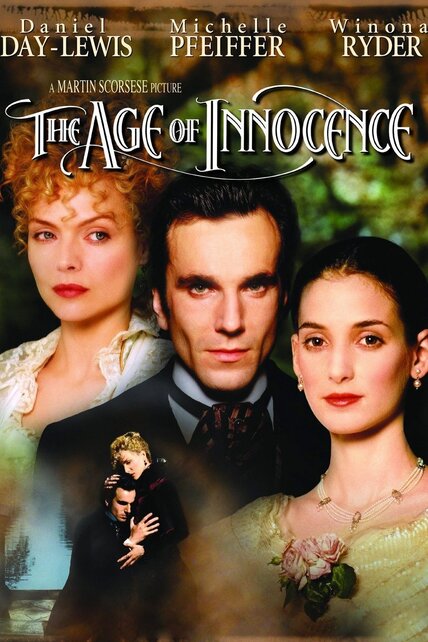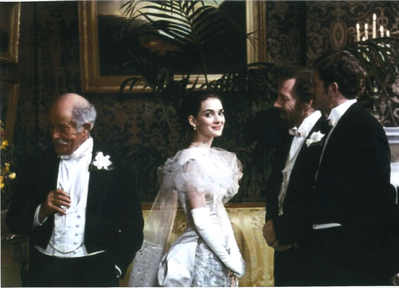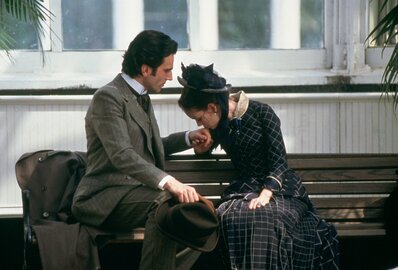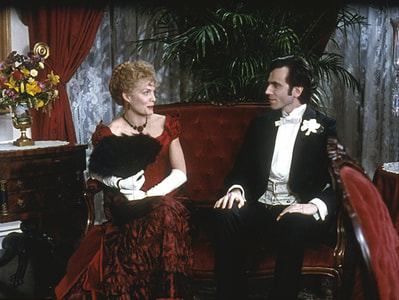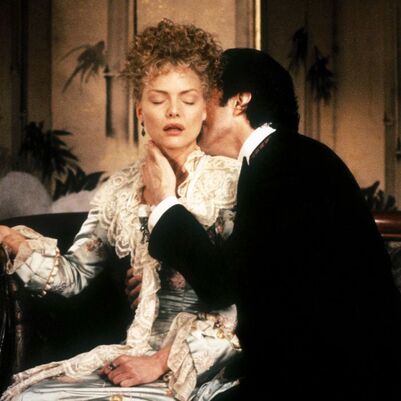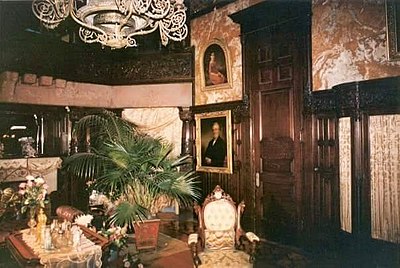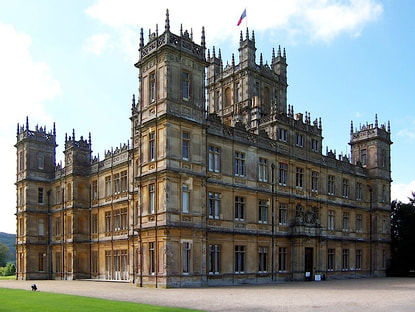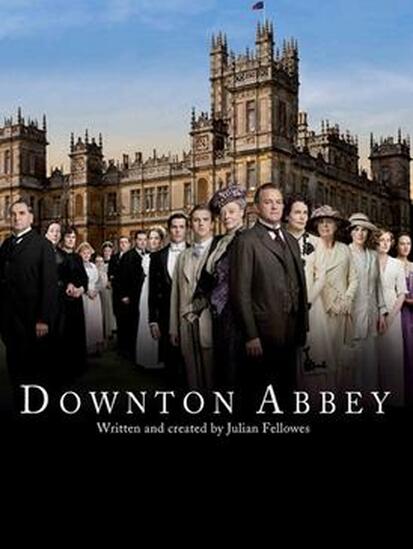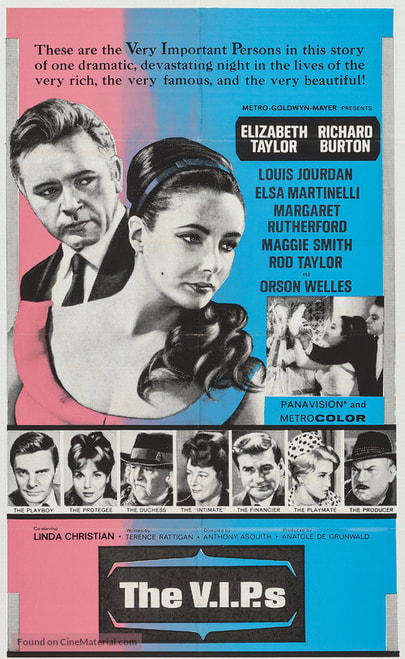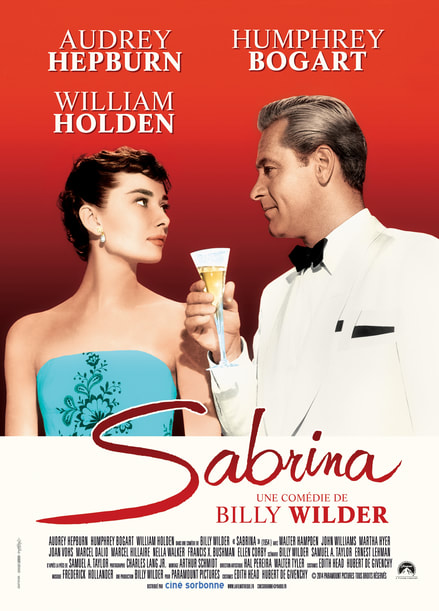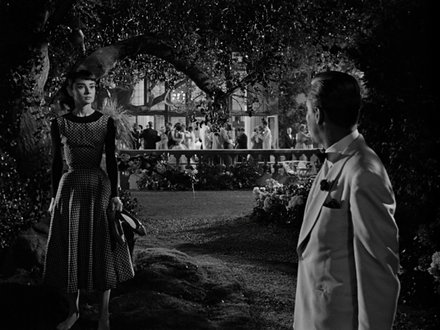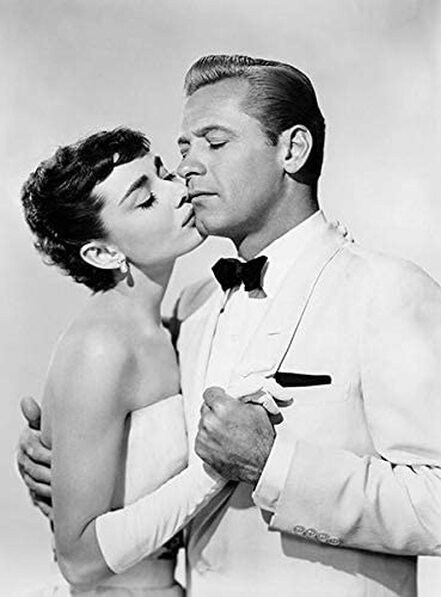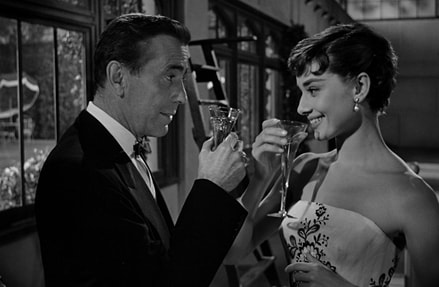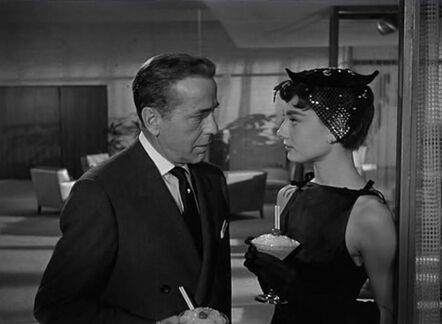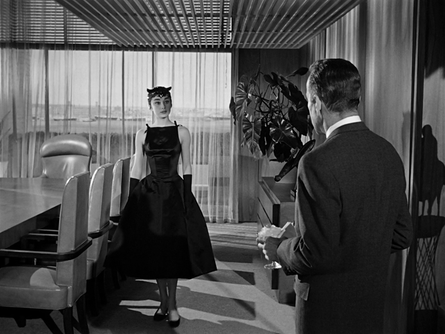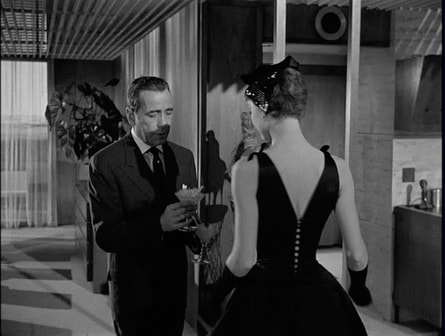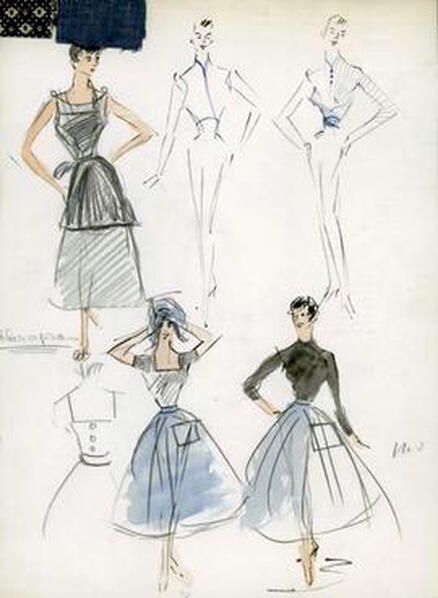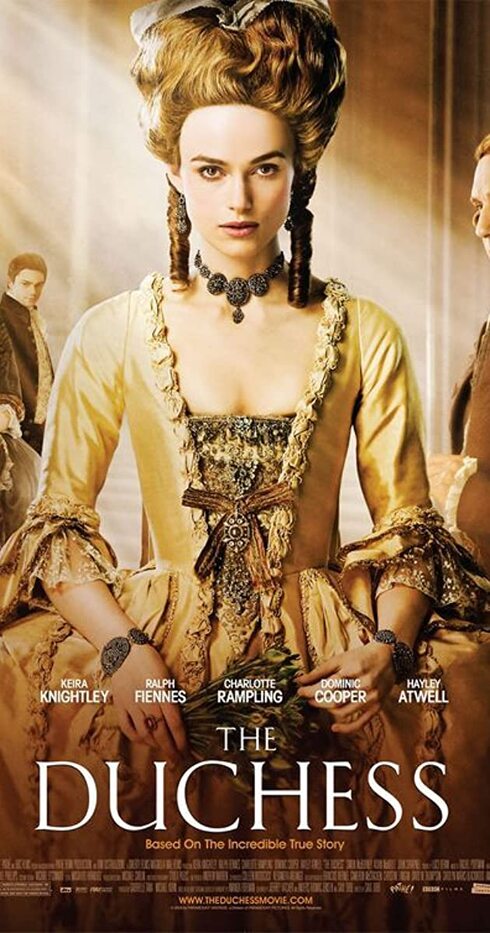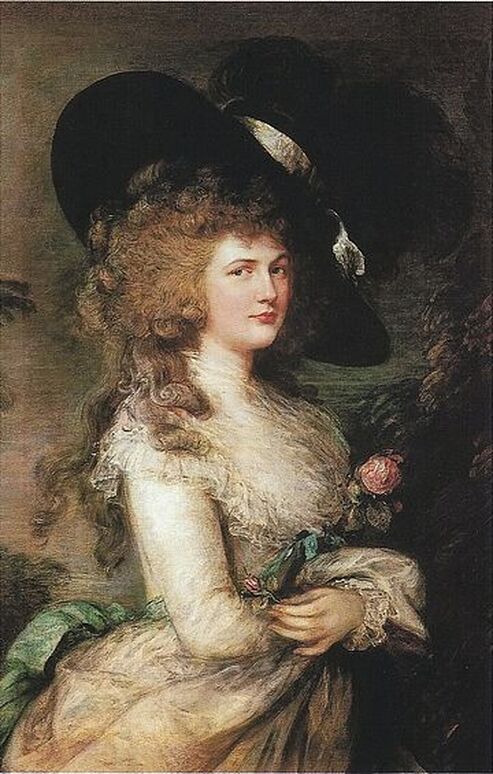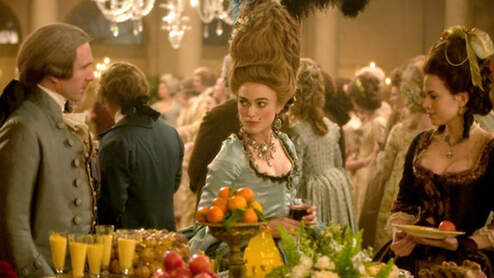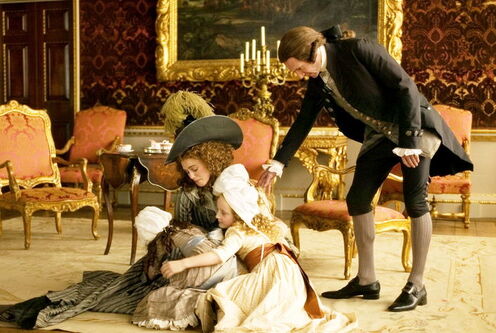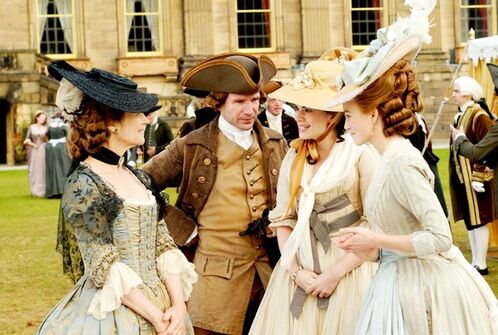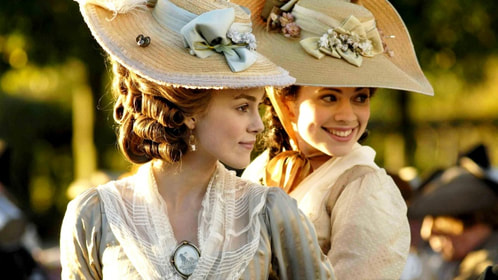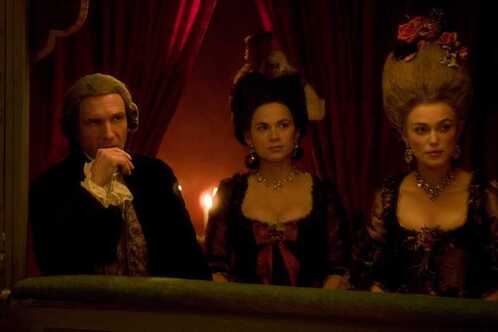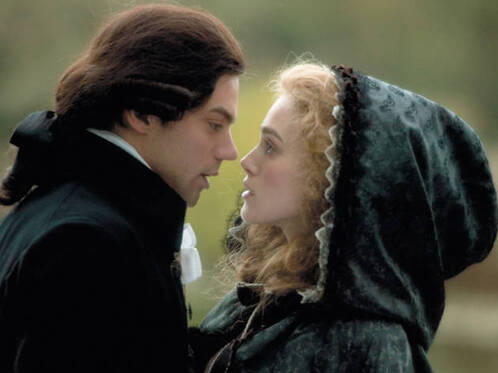The Age of Innocence(film, 1993)starring Daniel Day-Lewis, Michelle Pfeiffer, Winona Ryder1/10/2020 The Age of Innocence is a 1993 American historical romantic drama film directed by Martin Scorsese. The screenplay, an adaptation of the 1920 novel The Age of Innocence by Edith Wharton, was written by Scorsese and Jay Cocks. Scorsese's friend and screenwriter Jay Cocks gave him the Wharton novel in 1980, suggesting that this should be the romantic piece Scorsese should film, as Cocks felt it best represented his sensibility. In Scorsese on Scorsese the director noted Although the film deals with New York aristocracy and a period of New York history that has been neglected, and although it deals with code and ritual, and with love that's not unrequited but unconsummated—which pretty much covers all the themes I usually deal with—when I read the book, I didn't say, "Oh good, all those themes are here." The film stars Daniel Day-Lewis, Michelle Pfeiffer, Winona Ryder and Miriam Margolyes, and was released by Columbia Pictures. The film recounts the courtship and marriage of Newland Archer (Daniel Day-Lewis), a wealthy New York society attorney, to May Welland (Winona Ryder); Archer then encounters and legally represents Countess Olenska (Michelle Pfeiffer) prior to unexpected romantic entanglements. The Age of Innocence was released theatrically on October 1, 1993 by Columbia Pictures. It received critical acclaim, winning the Academy Award for Best Costume Design, and being nominated for Best Actress in a Supporting Role (Winona Ryder), Best Adapted Screenplay, Best Original Score and Best Art Direction. However, it was a box office failure, grossing $32.3 million against a $34 million budget. Scorsese dedicated the film to his father, Luciano Charles Scorsese, who had died the month before the film was released. Luciano and his wife, Catherine Scorsese, had small cameo appearances in the film. PlotIn 1870's New York City, gentleman lawyer Newland Archer is planning to marry the respectable young May Welland. May's cousin, the American heiress Countess Ellen Olenska, has returned to New York after a disastrous marriage to a dissolute Polish Count. At first she is ostracized by society and vicious rumors are spread, but, as May's family boldly stands by the countess, she is gradually accepted by the very finest of New York's old families. The countess is snubbed at one social party arranged by her family, but with the help of Archer, she is able to make a comeback at an event being hosted by the wealthy Van der Luydens. There she makes the acquaintance of one of New York's established financiers, Julius Beaufort, who has a reputation for risky affairs and dissipated habits. He begins to openly flirt with the countess both in public and in private. Archer prematurely announces his engagement to May, but as he comes to know the countess, he begins to appreciate her unconventional views on New York society and he becomes increasingly disillusioned with his new fiancée May and her innocence, lack of personal opinion, and sense of self. After the countess announces her intention of divorcing her husband, Archer supports her desire for freedom, but he feels compelled to act on behalf of the family and persuade the countess to remain married. When Archer realizes that he has unwittingly been falling in love with the countess, he abruptly leaves the next day to be reunited with May and her parents, who are in Florida on vacation. Archer asks May to shorten their engagement, but May becomes suspicious and asks him if his hurry to get married is prompted by the fear that he is marrying the wrong person. Archer reassures May that he is in love with her. When back in New York, Archer calls on the countess and admits that he is in love with her, but a telegram arrives from May announcing that her parents have pushed forward the wedding date. After their wedding and honeymoon, Archer and May settle down to married life in New York. Over time, Archer's memory of the countess fades. When the countess returns to New York to care for her grandmother, she and Archer agree to consummate their affair. But then suddenly, the countess announces her intention to return to Europe. May throws a farewell party for the countess, and after the guests leave, May announces to Archer that she is pregnant and that she told the Countess this news two weeks earlier. The years pass: Archer is 57 and has been a dutiful, loving father and faithful husband. The Archers have had three children. May has died of infectious pneumonia and Archer mourned her in earnest. Archer's engaged son, Ted, persuades him to travel to Paris. Ted has arranged for them to visit Countess Olenska there. Archer has not seen the her in over 25 years. Ted confides to his father that May had confessed on her deathbed that "... she knew we were safe with you, and always would be. Because once, when she asked you to, you gave up the thing you wanted most." Archer responds, "She never asked me." That evening outside the countess' apartment, Archer sends his son alone to visit her. Sitting outside in the courtyard, he recollects their time together and slowly walks off. ProductionThe Age of Innocence was filmed on location primarily in Troy, New York. The opera scenes were filmed at the Philadelphia Academy of Music in Philadelphia, Pennsylvania. The scenes set in the home of Mrs. Mingott were filmed in "The Castle", a fraternity house belonging to the Alpha Tau chapter of Pi Kappa Phi at Rensselaer Polytechnic Institute. Formerly known as the Paine Mansion, after its completion in 1896 (then-estimated to cost $500,000), it was heralded as the grandest house in all of Troy. The scenes depicting the country house in snow were filmed inside the circa 1737 Dutch-colonial Luykas Van Alen House, in Kinderhook, New York. Only one major set was built, for an ornate ballroom sequence at the Beaufort residence. The triangular Victorian Gothic Rice Building was used as the setting for the law office. The film's title sequence was created by Elaine and Saul Bass. The famous paintings featured in the film were newly created high-quality reproductions. The bursts of color employed as a fade out were inspired by the films Black Narcissus (1947), by Michael Powell, and Rear Window (1954), by Alfred Hitchcock. The film grossed $32.3 million in the US from a $34 million budget. By the end of 1993 it had grossed $15 million internationally. Cast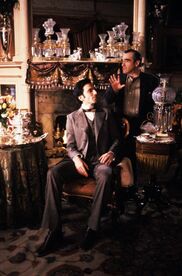
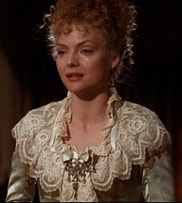
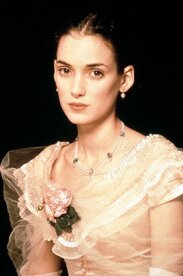
0 Comments
Downton Abbey is a British historical drama television series set in the early 20th century, created and co-written by Julian Fellowes. The series first aired on ITV in the United Kingdom on 26 September 2010, and in the United States on PBS, which supported production of the series as part of its Masterpiece Classic anthology, on 9 January 2011. The series, set in the fictional Yorkshire country estate of Downton Abbey between 1912 and 1926, depicts the lives of the aristocratic Crawley family and their domestic servants in the post-Edwardian era—with the great events of the time having an effect on their lives and on the British social hierarchy. Events depicted throughout the series include news of the sinking of the Titanic in the first series; the outbreak of the First World War, the Spanish influenza pandemic, and the Marconi scandal in the second series; the Irish War of Independence leading to the formation of the Irish Free State in the third series; the Teapot Dome scandal in the fourth series; the British general election of 1923 and the Beer Hall Putsch in the fifth series. The sixth and final series introduces the rise of the working class during the interwar period and hints at the eventual decline of the British aristocracy. Downton Abbey has received acclaim from television critics and won numerous accolades, including a Golden Globe Award for Best Miniseries or Television Film and a Primetime Emmy Award for Outstanding Miniseries or Movie. It was recognised by Guinness World Records as the most critically acclaimed English-language television series of 2011. It earned the most nominations of any international television series in the history of the Primetime Emmy Awards, with twenty-seven in total (after the first two series). It was the most watched television series on both ITV and PBS, and subsequently became the most successful British costume drama series since the 1981 television serial of Brideshead Revisited. On 26 March 2015, Carnival Films and ITV announced that the sixth series would be the last. It aired on ITV between 20 September 2015 and 8 November 2015. The final episode, serving as the annual Christmas special, was broadcast on 25 December 2015. A film adaptation Downton Abbey, serving as a continuation of the series, was subsequently released in the United Kingdom on 13 September 2019, and in the United States on 20 September 2019. The main cast of the Crawley family: -Hugh Bonneville as Robert Crawley, the Earl of Grantham -Elizabeth McGovern as his wife Cora Crawley, the Countess of Grantham. Their three daughters: -Michelle Dockery as Lady Mary Crawley (Talbot), -Laura Carmichael as Lady Edith Crawley (Pelham) -Jessica Brown Findlay as Lady Sybil Crawley (Branson). -Maggie Smith as Robert Crawley's mother Violet, Dowager Countess of Grantham. -Samantha Bond as Lady Rosamund Painswick, Robert's sister who resides in Belgrave Square, London. -Dan Stevens as Matthew Crawley, the new heir of Downton Abbey, and later husband of Lady Mary Crawley -Penelope Wilton as Isobel Crawley, mother of Matthew Crawley -Allen Leech as Tom Branson, the chauffeur and later husband of Lady Sybil -David Robb as Dr Richard Clarkson, the local town doctor. Highclere Castle in north Hampshire is used for exterior shots of Downton Abbey and most of the interior filming. The kitchen, servants' quarters and working areas, and some of the "upstairs" bedrooms were constructed and filmed at Ealing Studios. Bridgewater House in the St James area of London served as the family's London home. Outdoor scenes are filmed in the village of Bampton in Oxfordshire. The opening music of Downton Abbey, titled "Did I Make the Most of Loving You?", was composed by John Lunn.
The rights to broadcast Downton Abbey have been acquired in over 220 countries and territories, and the series is viewed by a global audience of an estimated 120 million people. The V.I.P.s(film, 13 September 1963) starring Elizabeth Taylor, Richard Burton and Louis Jourdan13/9/2020 The V.I.P.s (also known as Hotel International) is a 1963 British drama film in Metrocolor and Panavision. It was was written by Terence Rattigan, who said the film is based on the true story of actress Vivien Leigh's attempt to leave her husband, actor Laurence Olivier, and fly off with her lover, the actor Peter Finch, only to be delayed by a fog at Heathrow. The film has an all-star cast, including Richard Burton, Elizabeth Taylor, Louis Jourdan, Elsa Martinelli, Maggie Smith, Rod Taylor, Orson Welles and Margaret Rutherford, who won the Academy Award for Best Supporting Actress as well as the Golden Globe Award for Best Supporting Actress – Motion Picture. The director of the film Anthony Asquith intended for Sophia Loren to play Elizabeth Taylor's role, remembering the box-office success of The Millionairess (1960) he did with Loren in the main role. However, Taylor, scared by the appeal Loren had for Burton, persuaded Asquith to hire her instead; "Let Sophia stay in Rome", she told him. The film was produced by Anatole de Grunwald. It was shot entirely at MGM-British Studios, Borehamwood, Herts., with a few establishing shots filmed at what was then known as London Airport, later Heathrow. The terminal set was one of the largest ever constructed in the UK. The music score was by Miklós Rózsa. Critical reaction to the film was mixed. It nevertheless did extremely well at the box office, helped by the enormous publicity attached to Burton and Taylor's Cleopatra, which was out on release. Distributed by Metro-Goldwyn-Mayer, the film grossed $15,000,000 domestically, earning $7.5 million in U.S. theatrical rentals on a budget of $4 million. In addition to its North American success, it was one of the 12 most popular films in Britain in 1963. It had admissions of 765,804 in France. Slightly in advance of the film's release, as was the custom of the era, a paperback novelization of the screenplay was published by Dell Books. The author was renowned crime and western novelist Marvin H. Albert, who also made something of a cottage industry out of movie tie-ins. He seems to have been the most prolific screenplay novelizer of the late '50s through mid '60s, and, during that time, the preeminent specialist at light comedy, though he adapted a few drama scripts as well. The V.I.P.s is what's known as an "inferred novelization" because, although screenwriter Terence Rattigan is not given attribution anywhere on or in the book, the copyright is assigned to Metro-Goldwyn-Mayer. Whether this omission was an editorial error, or a marketing ploy to make Albert's novel seem to be the film's source material (with or without the complicity of Rattigan) is unknown. The film is set within Terminal 3 of London Heathrow Airport during a fog. As flights are delayed, the VIPs (very important people) of the title play out the drama of their lives in a number of slightly interconnected stories. The delays have caused serious hardship for most of the characters and have plunged some of them into a deep personal or financial crisis. The central story concerns famed actress Frances Andros (Elizabeth Taylor) trying to leave her husband, millionaire Paul Andros (Richard Burton), and fly away with her suitor Marc Champselle (Louis Jourdan). Because of the fog, Andros has the opportunity to come to the airport to persuade his wife not to leave him. The Duchess of Brighton (Margaret Rutherford) is on her way to Florida to take a job, which will pay her enough money to save her historic home. Meanwhile, film producer Max Buda (Orson Welles) needs to leave London, taking his newest protégée Gloria Gritti (Elsa Martinelli) with him, by midnight if he is to avoid paying a hefty tax bill. Les Mangrum (Rod Taylor), an Australian businessman, must get to New York City to prevent his business from being sold. His dutiful secretary, Miss Mead (Maggie Smith), is secretly in love with him. It being a matter of great urgency, she decides to approach Paul Andros and ask him to advance a sum of money that will save Mangrum's company. Buda spots a poster picturing the Duchess's home. She is offered a sum of money if she will permit Buda to use it as a location in a film, enough to keep the house she loves. Andros, meanwhile, about to lose the woman he loves, is spared a possible suicide at the last minute when he and his wife reconcile. The cast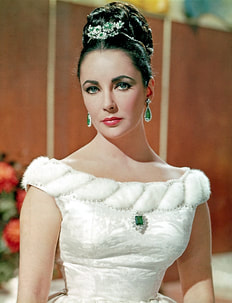 Elizabeth Taylor as Frances Andros 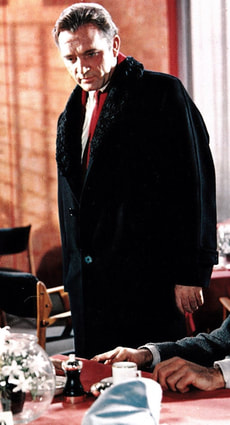 Richard Burton as Paul Andros 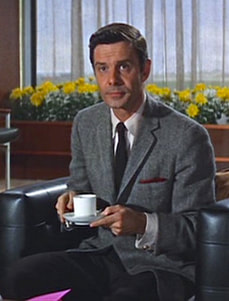 Louis Jourdan as Marc Champselle 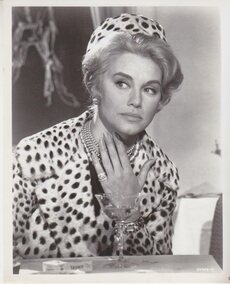 Sabrina (Sabrina Fair/La Vie en Rose in the United Kingdom) is a 1954 American romantic comedy-drama film directed by Billy Wilder, adapted for the screen by Wilder, Samuel A. Taylor and Ernest Lehman from Taylor's 1953 play Sabrina Fair. The picture stars Humphrey Bogart, Audrey Hepburn and William Holden. This was Wilder's last film released by Paramount Pictures, ending a 12-year business relationship between Wilder and the company. The film was selected for preservation in the United States National Film Registry by the Library of Congress in 2002. PlotSabrina Fairchild is the young daughter of the Larrabee family's chauffeur, Thomas, and has been in love with David Larrabee all her life. David is a three-times-married playboy who has never paid attention to Sabrina because to him she was still a child. Eavesdropping on a party at the Larrabee mansion, as she has often done before, Sabrina notices David enticing yet another woman. Distraught, she leaves her father a suicide note and starts every car in the garage so as to kill herself. Instead she is interrupted by David's older brother Linus, who escorts her back to her quarters above the garage. Sabrina had been on the point of sailing for France, where she is to attend Le Cordon Bleu, the leading culinary school in Paris. After two years there, she returns home as an attractive and sophisticated woman. When her father is delayed from picking her up at the station, David offers her a lift instead without even knowing it is Sabrina. Once David realizes who she is, he is quickly drawn to Sabrina and invites her to join him at a party at the mansion. When Linus sees this, he fears that David's imminent marriage to Elizabeth Tyson may be endangered. If the engagement is broken, it would ruin a profitable opportunity for a great corporate merger between Larrabee Industries and Elizabeth's very wealthy father's business. Instead of confronting David about his irresponsibility, Linus pretends to sympathize with him. In a moment of inattention, David sits down on champagne glasses he has placed in his pockets, so that he is incapacitated for a few days. Linus now takes David's place with Sabrina on the pretext that “it’s all in the family” until both fall in love, although neither will admit it. In fact Linus’ plan is to pretend to be accompanying Sabrina back to Paris but not to join her on the liner. However, when he reveals his intention to Sabrina instead, she agrees to leave the next day and never come back. The following morning, Linus has second thoughts and decides to send David to Paris with Sabrina. This means calling off David's wedding with Elizabeth and the big Tyson deal, and he schedules a meeting of the Larrabee board to announce this. David enters the room at the last minute and declares that he has decided to marry Elizabeth after all. David helps Linus recognize his own feelings for Sabrina and assists him in rushing off to join Sabrina's ship before it leaves the harbor. Linus and Sabrina meet on board and sail away together. Cast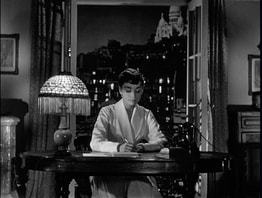 Audrey Hepburn as Sabrina Fairchild 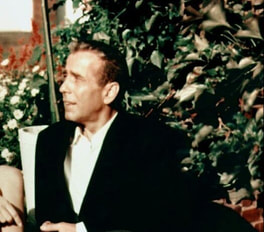 Humphrey Bogart as Linus Larrabee 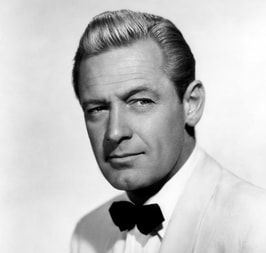 William Holden as David Larrabee ProductionInitially, Cary Grant was considered for the role of Linus, but he declined, and the role was taken by Humphrey Bogart. Best known for playing tough detectives and adventurers, Bogart was cast against type as a smart businessman gradually transformed into a romantic lead. During production of the film, Audrey Hepburn and William Holden entered into a brief but passionate and much-publicized love affair. Bogart had originally wanted his wife Lauren Bacall to be cast as Sabrina. He complained that Hepburn required too many takes to get her dialogue right and pointed out her inexperience. Bogart was very unhappy during the filming, convinced that he was totally wrong for this kind of film, mad at not being Wilder's first choice, and not liking Holden or Wilder. Wilder began shooting before the script was finished, and Ernest Lehman was writing all day to complete it. Eventually he would finish a scene in the morning, deliver it during lunch, and filming of it would begin in the afternoon. Although Edith Head won an Oscar for Best Costumes, most of Hepburn's outfits are rumored to have been created by Hubert de Givenchy and chosen personally by the star. In a 1974 interview, Head stated that she was responsible for creating the dresses, with inspiration from some Givenchy designs that Hepburn liked, but that she made important changes, and the dresses were not by Givenchy. After Head's death, Givenchy stated that Sabrina's iconic black cocktail dress was produced at Paramount under Head's supervision but claimed it was his design. The film began a lifelong association between Givenchy and Hepburn. The location used to portray the Larrabee family's mansion in Glen Cove, New York was 'Hill Grove', the home of George Lewis in Beverly Hills, California. This mansion was later demolished during the 1960s. The location used to portray the Glen Cove train station was the Glen Cove train station on the Oyster Bay Branch of the Long Island Rail Road. The building at 30 Broad Street in Manhattan's financial district was used as the location for the headquarters of the Larrabee company. The film opened in New York and Los Angeles on September 23, 1954 and was number one at the US box office for two weeks.
In 1995 Paramount Pictures remade the film. The Duchess is a 2008 British drama film directed by Saul Dibb. It is based on Amanda Foreman's biography of the late 18th-century English aristocrat Georgiana Cavendish, Duchess of Devonshire. It starred Keira Knightley, Ralph Fiennes and Hayley Atwell, and was released in September 2008 in the United Kingdom. The film won the Academy Award for Best Costume Design, and was nominated for Best Art Direction. The young Georgiana is contracted in marriage to William Cavendish, Duke of Devonshire, with the expectation that she produces his male heir. Georgiana is quickly disillusioned by her husband, especially when Charlotte, a motherless child, comes to live with them while Georgiana is pregnant. William expects Georgiana to tolerate the child's presence, who turns out to be his own illegitimate offspring. He also suggests that she "practise mothering" on the young girl. When Georgiana gives birth to a girl, William is displeased. In his mind, he has fulfilled his obligations to her as her husband but, by failing to provide him with a legitimate male heir, she has failed in her obligations as his wife. Georgiana socialises with the young Lady Bess Foster at Bath and kindly invites her to live with them since Bess has nowhere else to go. William has an affair with Bess, causing Georgiana to feel robbed of her only friend and betrayed by Bess. Bess explains to Georgiana that her motive is to regain her three sons (whom her husband has taken from her), so she continues to live with them. Georgiana starts an affair with Charles Grey. William is outraged when Georgiana suggests that since he has Bess, she should be allowed Charles as a distraction. William rapes Georgiana; a male child is the product. Bess encourages the affair between Georgiana and Charles after the birth of Georgiana's son. Soon, the whole of London society comes to know of Georgiana's affair. William threatens to end Charles's political career and forbid Georgiana from seeing her children again if she does not end the relationship. After initially resisting, Georgiana ends her relationship with Grey but tells William that she is pregnant with Charles' child. She is sent to the countryside where she secretly gives birth to her daughter with Grey, Eliza Courtney, who is given to the Grey family to raise as Charles' niece. Georgiana finds comfort in Bess's friendship during her time of giving birth to Eliza. Georgiana and William come to terms with one another and, along with Bess, continue their lives together. The after-credits reveal Georgiana secretly visits her daughter Eliza. Eliza goes on to name her own daughter Georgiana, after her mother. Charles later becomes Prime Minister of the United Kingdom under William IV. Before she dies, Georgiana permits William and Bess to marry. The Duchess was produced by British Qwerty Films and American Magnolia Mae Films, with financial support from BBC Films, French Pathé and Italian BIM Distribuzione. The film was shot at Twickenham Film Studios and on location at Chatsworth, Bath, Holkham Hall, Clandon Park, Kedleston Hall, Somerset House, King's College London and the Old Royal Naval College in Greenwich. Studio executives wanted to use digitally altered images of Keira Knightley in promotional materials. The alterations were specifically aimed at enlarging her breasts. Knightley objected to the alterations, and they were not used. Although multiple media reports suggested that the use of parallels between the central character's life and that of Diana, Princess of Wales was being used as a marketing strategy for the project, Knightley denied any such connection. The film had its world premiere on 3 September 2008, in Leicester Square and was released nationwide in the United Kingdom on 5 September. The cast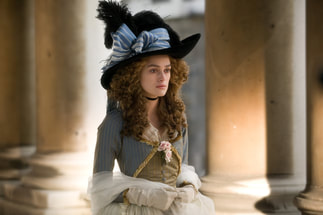 Keira Knightley as Georgiana Cavendish, Duchess of Devonshire 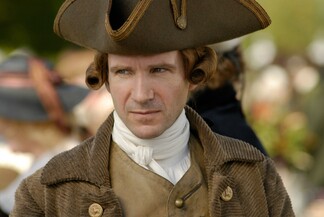 Ralph Fiennes as William Cavendish, 5th Duke of Devonshire 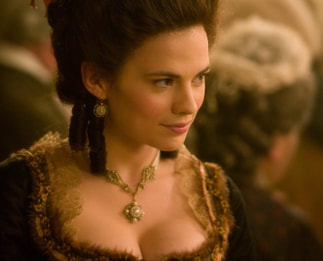 Hayley Atwell as Lady Elizabeth 'Bess' Foster |
Categories
All
Archives
October 2023
|
